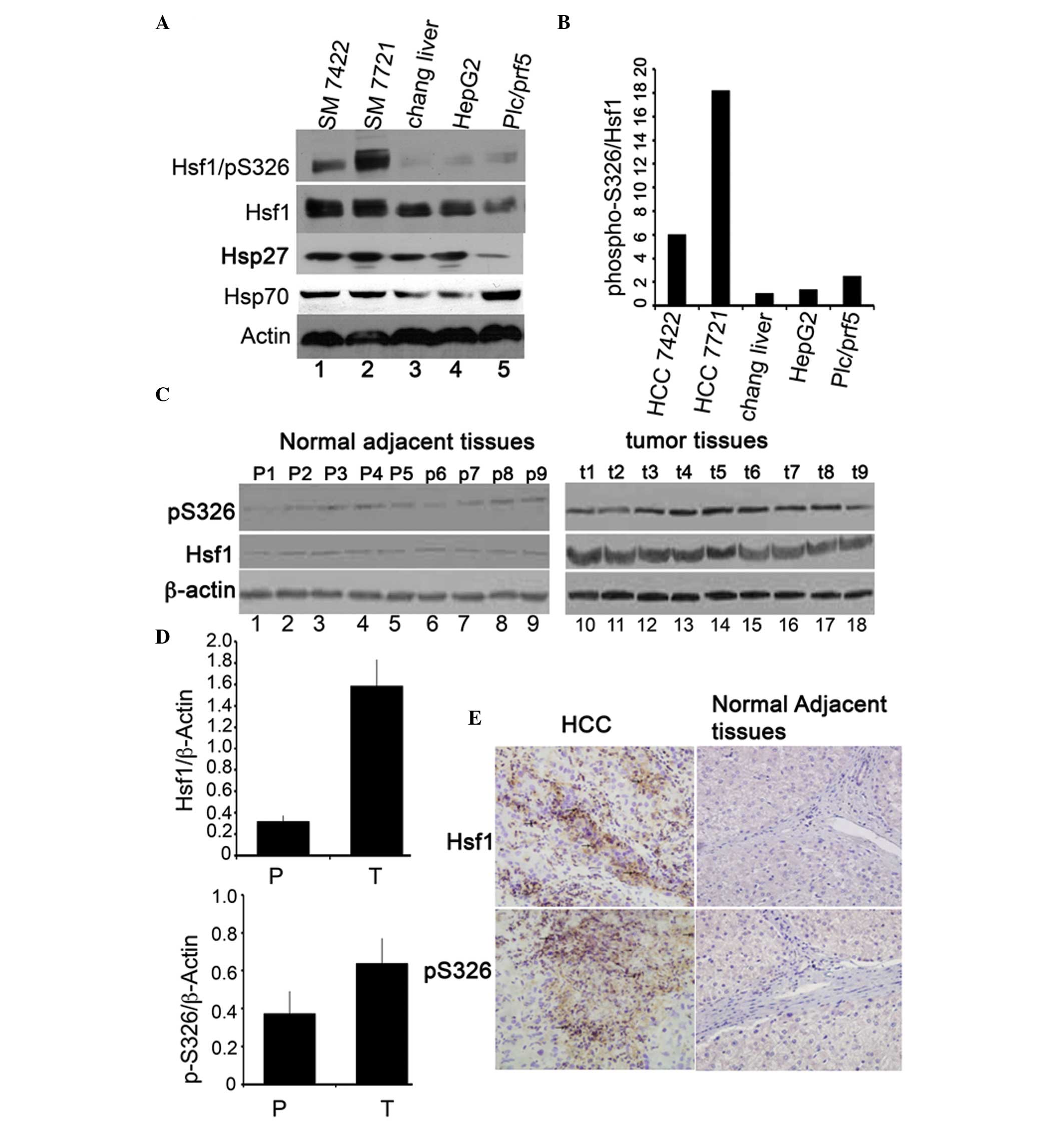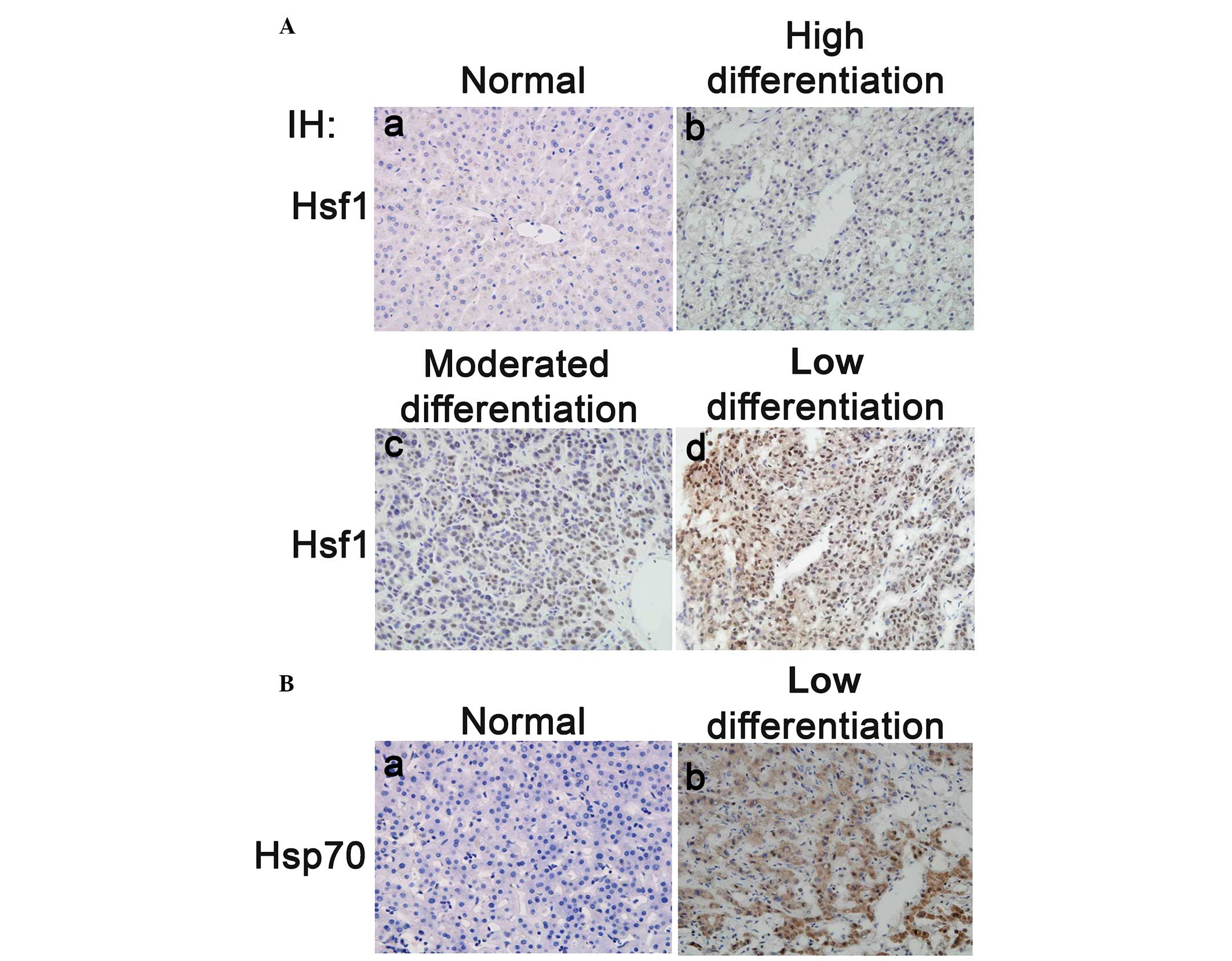|
1
|
Sorger PK: Heat shock factor and the heat
shock response. Cell. 65:363–366. 1991. View Article : Google Scholar : PubMed/NCBI
|
|
2
|
Qian SB, McDonough H, Boellmann F, et al:
CHIP-mediated stress recovery by sequential ubiquitination of
substrates and HSP70. Nature. 440:551–555. 2006. View Article : Google Scholar : PubMed/NCBI
|
|
3
|
Christians E: HSF1 knock-out. J Biol Chem.
286:le26–le27. 2011. View Article : Google Scholar : PubMed/NCBI
|
|
4
|
Dai C, Whitesell L, Rogers AB and
Lindquist S: Heat shock factor 1 is a powerful multifaceted
modifier of carcinogenesis. Cell. 130:1005–1018. 2007. View Article : Google Scholar : PubMed/NCBI
|
|
5
|
Meng L, Gabai VL and Sherman MY:
Heat-shock transcription factor HSF1 has a critical role in human
epidermal growth factor receptor-2-induced cellular transformation
and tumorigenesis. Oncogene. 29:5204–5213. 2010. View Article : Google Scholar
|
|
6
|
Wang Y, Theriault JR, He H, et al:
Expression of a dominant negative heat shock factor-1 construct
inhibits aneuploidy in prostate carcinoma cells. J Biol Chem.
279:32651–32659. 2004. View Article : Google Scholar : PubMed/NCBI
|
|
7
|
Mendillo ML, Santagata S, Koeva M, et al:
HSF1 drives a transcriptional program distinct from heat shock to
support highly malignant human cancers. Cell. 150:549–562. 2012.
View Article : Google Scholar : PubMed/NCBI
|
|
8
|
Santón A, García-Cosío M, Cristóbal E, et
al: Expression of heat shock proteins in classical Hodgkin
lymphoma: correlation with apoptotic pathways and prognostic
significance. Histopathology. 58:1072–1080. 2011.PubMed/NCBI
|
|
9
|
Xi C, Hu Y, Buckhaults P, et al: Heat
shock factor HSF1 cooperates with ErbB2 (Her2/Neu) protein to
promote mammary tumorigenesis and metastasis. J Biol Chem.
287:35646–35657. 2012. View Article : Google Scholar : PubMed/NCBI
|
|
10
|
Cheng Q, Chang JT, Geradts J, et al:
Amplification and high-level expression of heat shock protein 90
marks aggressive phenotypes of human epidermal growth factor
receptor 2 negative breast cancer. Breast Cancer Res. 14:R622012.
View Article : Google Scholar
|
|
11
|
Calderwood SK and Gong J: Molecular
chaperones in mammary cancer growth and breast tumor therapy. J
Cell Biochem. 113:1096–1103. 2012. View Article : Google Scholar : PubMed/NCBI
|
|
12
|
Kamal A, Thao L, Sensintaffar J, et al: A
high-affinity conformation of Hsp90 confers tumour selectivity on
Hsp90 inhibitors. Nature. 425:407–410. 2003. View Article : Google Scholar : PubMed/NCBI
|
|
13
|
Zhang F, Lazorchak AS, Liu D, et al:
Inhibition of the mTORC2 and chaperone pathways to treat leukemia.
Blood. 119:6080–6088. 2012. View Article : Google Scholar : PubMed/NCBI
|
|
14
|
Modi S, Stopeck A, Linden H, et al: HSP90
inhibition is effective in breast cancer: a phase II trial of
tanespimycin (17-AAG) plus trastuzumab in patients with
HER2-positive metastatic breast cancer progressing on trastuzumab.
Clin Cancer Res. 17:5132–5139. 2011. View Article : Google Scholar : PubMed/NCBI
|
|
15
|
Min JN, Huang L, Zimonjic DB, et al:
Selective suppression of lymphomas by functional loss of HSF1 in a
p53-deficient mouse model for spontaneous tumors. Oncogene.
26:5086–5097. 2007. View Article : Google Scholar : PubMed/NCBI
|
|
16
|
Jin X, Moskophidis D and Mivechi NF: Heat
shock transcription factor 1 is a key determinant of HCC
development by regulating hepatic steatosis and metabolic syndrome.
Cell Metab. 14:91–103. 2011. View Article : Google Scholar : PubMed/NCBI
|
|
17
|
Zou J, Guo Y, Guettouche T, et al:
Repression of heat shock transcription factor HSF1 activation by
HSP90 (HSP90 complex) that forms a stress-sensitive complex with
HSF1. Cell. 94:471–480. 1998. View Article : Google Scholar
|
|
18
|
Shi Y, Mosser DD and Morimoto RI:
Molecular chaperones as HSF1-specific transcriptional repressors.
Genes Dev. 12:654–666. 1998. View Article : Google Scholar : PubMed/NCBI
|
|
19
|
Bulman AL, Hubl ST and Nelson HC: The
DNA-binding domain of yeast heat shock transcription factor
independently regulates both the N- and C-terminal activation
domains. J Biol Chem. 276:40254–40262. 2001. View Article : Google Scholar
|
|
20
|
Hietakangas V, Ahlskog JK, Jakobsson AM,
et al: Phosphorylation of serine 303 is a prerequisite for the
stress-inducible SUMO modification of heat shock factor 1. Mol Cell
Biol. 23:2953–2968. 2003. View Article : Google Scholar : PubMed/NCBI
|
|
21
|
Peng W, Zhang Y, Zheng M, et al:
Cardioprotection by CaMKII-deltaB is mediated by phosphorylation of
heat shock factor 1 and subsequent expression of inducible heat
shock protein 70. Circ Res. 106:102–110. 2010. View Article : Google Scholar : PubMed/NCBI
|
|
22
|
Holmberg CI, Hietakangas V, Mikhailov A,
et al: Phosphorylation of serine 230 promotes inducible
transcriptional activity of heat shock factor 1. EMBO J.
20:3800–3810. 2001. View Article : Google Scholar : PubMed/NCBI
|
|
23
|
Chou SD, Prince T, Gong J and Calderwood
SK: mTOR is essential for the proteotoxic stress response, HSF1
activation and heat shock protein synthesis. PLoS One.
7:e396792012. View Article : Google Scholar : PubMed/NCBI
|
|
24
|
Han KH, Kudo M, Ye SL, et al: Asian
consensus workshop report: expert consensus guideline for the
management of intermediate and advanced hepatocellular carcinoma in
Asia. Oncology. 81:158–64. 2011. View Article : Google Scholar
|
|
25
|
Yoshimoto S, Loo TM, Atarashi K, et al:
Obesity-induced gut microbial metabolite promotes liver cancer
through senescence secretome. Nature. 499:97–101. 2013. View Article : Google Scholar : PubMed/NCBI
|
|
26
|
Bertino G, Ardiri A, Malaguarnera M, et
al: Hepatocellular carcinoma serum markers. Semin Oncol.
39:410–433. 2012. View Article : Google Scholar
|
|
27
|
Fang F, Chang R and Yang L: Heat shock
factor 1 promotes invasion and metastasis of hepatocellular
carcinoma in vitro and in vivo. Cancer. 118:1782–1794. 2012.
View Article : Google Scholar : PubMed/NCBI
|
|
28
|
Gruden G, Carucci P, Lolli V, et al: Serum
heat shock protein 27 levels in patients with hepatocellular
carcinoma. Cell Stress Chaperones. 18:235–241. 2013. View Article : Google Scholar : PubMed/NCBI
|
|
29
|
Rossi A, Ciafrè S, Balsamo M, et al:
Targeting the heat shock factor 1 by RNA interference: a potent
tool to enhance hyperthermochemotherapy efficacy in cervical
cancer. Cancer Res. 66:7678–7685. 2006. View Article : Google Scholar : PubMed/NCBI
|
|
30
|
Zhang J, Hu YZ, Xueli L, et al: The
inhibition of CMV promoter by heat shock factor 4b is regulated by
Daxx. Int J Biochem Cell Biol. 42:1698–1707. 2010. View Article : Google Scholar : PubMed/NCBI
|
|
31
|
Raney AK, Milich DR, Easton AJ and
McLachlan A: Differentiation-specific transcriptional regulation of
the hepatitis B virus large surface antigen gene in human hepatoma
cell lines. J Virol. 64:2360–2368. 1990.
|
|
32
|
Jin X, Moskophidis D, Hu Y, et al: Heat
shock factor 1 deficiency via its downstream target gene
alphaB-crystallin (Hspb5) impairs p53 degradation. J Cell Biochem.
107:504–515. 2009. View Article : Google Scholar : PubMed/NCBI
|
|
33
|
Huynh H: Molecularly targeted therapy in
hepatocellular carcinoma. Biochem Pharmacol. 80:550–560. 2010.
View Article : Google Scholar : PubMed/NCBI
|
|
34
|
Lecomte S, Desmots F, Le Masson F, et al:
Roles of heat shock factor 1 and 2 in response to proteasome
inhibition: consequence on p53 stability. Oncogene. 29:4216–4224.
2010. View Article : Google Scholar : PubMed/NCBI
|
|
35
|
Kim EH, Lee YJ, Bae S, et al: Heat shock
factor 1-mediated aneuploidy requires a defective function of p53.
Cancer Res. 69:9404–9412. 2009. View Article : Google Scholar : PubMed/NCBI
|
|
36
|
Rokavec M, Wu W and Luo JL: IL6-mediated
suppression of miR-200c directs constitutive activation of
inflammatory signaling circuit driving transformation and
tumorigenesis. Mol Cell. 45:777–789. 2012. View Article : Google Scholar
|
|
37
|
Chew V, Tow C, Teo M, et al: Inflammatory
tumour microenvironment is associated with superior survival in
hepatocellular carcinoma patients. J Hepatol. 52:370–379. 2010.
View Article : Google Scholar : PubMed/NCBI
|
|
38
|
Xue H, Slavov D and Wischmeyer PE:
Glutamine-mediated dual regulation of heat shock transcription
factor-1 activation and expression. J Biol Chem. 287:40400–40413.
2012. View Article : Google Scholar : PubMed/NCBI
|
|
39
|
Wen W, Ding J, Sun W, et al: Cyclin
G1-mediated epithelial-mesenchymal transition via phosphoinositide
3-kinase/Akt signaling facilitates liver cancer progression.
Hepatology. 55:1787–1798. 2012. View Article : Google Scholar : PubMed/NCBI
|
|
40
|
Xia L, Huang W, Tian D, et al:
Overexpression of forkhead box C1 promotes tumor metastasis and
indicates poor prognosis in hepatocellular carcinoma. Hepatology.
57:610–624. 2013. View Article : Google Scholar : PubMed/NCBI
|


















